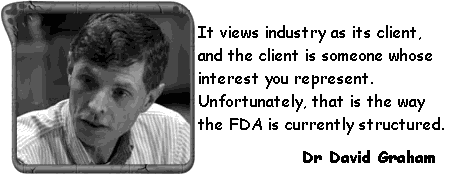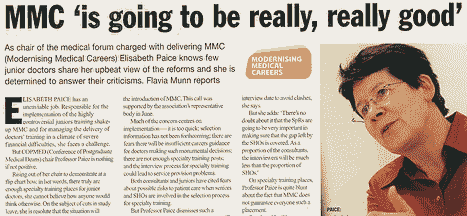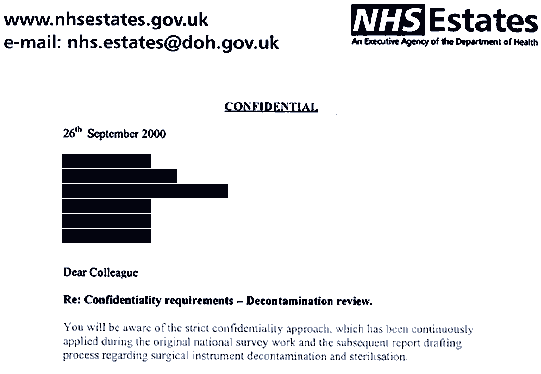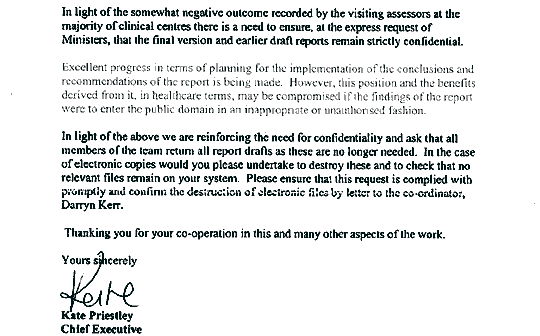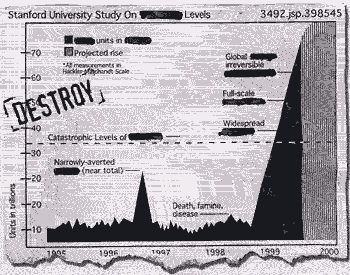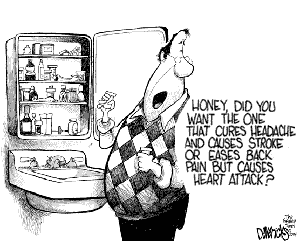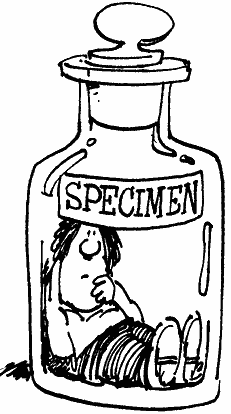Scientific Misconduct Blog Memory Hole: Events of November 10th
1 years ago today: Statins decrease cholesterol by 0.13mmol/L
On 10 November 2006 a paper in the Journal of Internal Medicine (260; 551) reported that average cholesterol levels had fallen considerably in Swedish men between 1986 and 2006 - from 6.32 to 5.51 mmol/L. Almost none of this decrease was due to statins. Fewer than 10% of people were a lipid lowering drug, and these accounted for only 0.13 mmol/L of the population decrease.
2 years ago today: GSK: Our product is.......
On
10 November 2005 Chris Viehbacher, head of U.S. operations at GlaxoSmithKline Plc, was quoted as saying "In the long term Glaxo would like to spend a lot more on researching new medicines and a lot less on selling them".."
So far we haven't found a more effective way of educating physicians."
The product is science.
Chris Viehbacher is an accountant. I have seen no comment from Viehbacher on any possible deception in GSK drug trials, or those trials that disappeared. Perhaps Silence is part of the "education".
Source: Hirschler, Ben. "Drug giants wary on cutting sales forces", Reuters, 2005-11-10.
3 years ago today: Pfizer and Bextra - optional truthfulness
On
10 November 2004 Pfizer entered the scientific debate over their hidden Bextra data - by abusing critics.
Cardiologist Garret FitzGerald reported a pooled analysis of clinical trial results showed patients taking Pfizer's arthritis drug Bextra were twice as likely to have a heart attack or stroke as those taking a placebo. When reports appeared in the New York Times, instead of addressing the science Pfizer attacked back. The report they said "draws unsubstantiated conclusions about the cardiovascular safety of" Bextra and "is based on information that has not been published in a medical journal or subject to independent scientific review."
Their product is science but there was no science in the response. Five months later on April 7, 2005, Pfizer withdrew Bextra from the U.S. market.
Pfizer has since disclosed that, at the time of those statements, it did indeed have studies that demonstrated heart problems among patients taking Celebrex or Bextra. When a Pfizer scientist said that there was no clear evidence that Celebrex posed a risk, members of the FDA committee stated: "That just doesn't pass the laugh test" (Dr. Alastair Wood, chairman of the hearing). Wood noted that Pfizer omitted from its presentation the key study that documented problems with Celebrex. One panel member accused Pfizer of hiding data. Dr. Curt Furberg of Wake Forest University stated "I'm troubled by some inconsistencies that I have found in the briefing document from Pfizer." Furberg suggested that all of Pfizer's mistakes seemed to benefit the company. "So I wonder how much trust can we put in these presentations" he said.
Professor Ralph D'Agostino told the committee "We really don't know what to make out of any long-term use" based on Pfizer's studies that lasted only a few weeks".
Dr. Verburg of Pfizer responded simply, "We recognize all of the faults in what we are doing"
Dr. Byron Cryer of the University of Texas Southwestern Medical Center, described part of the Pfizer presentation as "misleading."
Dr. Verburg of Pfizer responded simply, "
Point taken."
But the
point Dr. Verburg is that this is quackery and bad science. Perhaps it is not science at all. People die as a result.
Sources:
See FDA report 7 April 2005 http://www.fda.gov/cder/drug/InfoSheets/HCP/valdecoxibHCP.htm
Systematic review of Bextra in JAMA http://www.cox2drugreview.org/
Medical Panel Poses Pointed Questions to Drug Makers Over Risks of Painkillers, New York Times 17 Feb 20055 years ago today: UK Labour government brings integrity to the NHS
On
10 November 2002 the UK government Health Secretary Alan Milburn
was criticized for hiring the American private insurer United Healthcare to help "cut costs in the NHS by keeping the elderly patients out of hospital".
As the Observer "discovered" without much difficulty "United Healthcare has been forced to pay millions of dollars in fines to settle charges that it had defrauded the US government, patients and doctors", had "falsely charged the US government for patients it claimed were in nursing homes" by inventing institutionalized patients, and had been fined for "cheating patients out of money". The firm had also been "failing to give proper notice of the right to appeal" when denying patients healthcare, and Michael Mooney, a United vice-president, was jailed for three and a half years for insider trading.
About time New Labour started saying the unthinkable and admitting their moral and intellectual bankruptcy in the area of healthcare and medicines regulation.
Milburn apparently holds a place on the board of PepsiCo. On 28 February 2007, he launched 2020 Vision, a website intended to promote policy debate (well debate then). There is a Chinese saying, "a fish begins to smell from the head down..."
Source: UK's elderly care plan run by US "cheats", the Observer, Nov 10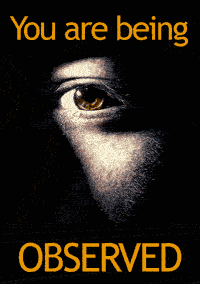
4 years ago today: Another P&G spying case
On
10 November 2003 Procter and Gamble were exposed in the
Chicago Sun Times for their involvement with Wallmart in an escapade which involved
spying on customers. Briefly, Lipfinity lipstick was tagged with an electronic (RFID) tracking device between March and July 2003. Customers unwittingly left the store carrying the tag.
At the same time a live video camera trained on the shelf allowed Procter & Gamble employees (700 miles away) to observe and videotape the Lipfinity display and consumers interacting with it. "Given the players, the Wal-Mart Lipfinity trial probably isn't an isolated incident," says CASPIAN spokeswoman Liz McIntyre. "documents suggest that other products, including Huggies baby wipes, Pantene shampoo, Caress soap, Purina Dog Chow and Right Guard deodorant were also slated for live RFID field trials".
In P&G's
defense it could be said that the video material was apparently not kept, and the videos were mostly of the back of customer's heads. Bizarrely, it was also stated that "the test was not secret. There was a sign near the Lipfinity display that alerted customers that closed-circuit televisions and electronic merchandise security systems are in place in the store."
In 2006 P&G's received first prize in the annual
Most Trusted Company for Privacy Award. They consolidated their position that year by releasing the
long-denied raw data to researchers who had "authored" schlonky publications about their osteoporosis drug Actonel. Onwards and upwards.
See:
more on RFID devices8 years ago today: Scientific fraud involving three drugs - prison anyone?
On
10 November 1999 an editorial in JAMA discussed
ondansetron, a drug that was being studied to prevent vomiting. Researchers analyzing the literature found 84 studies involving 11,980 patients -- or so they thought. Some of the data had been published twice, and when the researchers sorted it out, they realized that there were really only 70 studies, in 8,645 patients.
Since the duplicated data was the good data, the reviewers estimated this double-counting would lead to a 23 percent overestimate of the drug's effectiveness.
Similarly data for the antipsychotic agent
risperidone had been published multiple times in different journals, under different authors' names.
Other problems involving
fluconazole (made by
Pfizer) were reported. Fluconazole had been compared with Amphoteracin B, but on close inspection it appeared that the Amphoteracin had been given by mouth instead of intravenously (it is not at all effective orally and is supposed to be given by drip).
Dr. Michael O'Connell, deputy director of the Mayo Clinic Cancer Center in Rochester, Minn., an expert on clinical trials, said: "To publish the same data again with entirely different authorship, as if it were an entirely different data set, is
reprehensible".
The problem is that the authors of the papers probably didn't even know, because they had almost certainly never seen the data, and were just brain-dead drones and fraudsters.The reviewers tried to ask the authors about the design of the studies and for the data. Some ignored the requests, and others said they no longer had the data. Pfizer declined comment to JAMA.
Dr. Bert Spilker, senior vice president for scientific and regulatory affairs at PhRMA, the lobby group for drug manufacturers, said: "
We don't have a perfect situation. It probably can be improved." Scientific fraud is not "a perfect situation" when your industry is supposed to be selling products under the banner of science. When patients die as a result of faulty misleading science it is obviously not "a perfect situation" either. As usual, nobody was held to account.
See: Medical Journal Cites Misleading Drug Research, NY Times, 10 Nov 1999
16 years ago today: A company employs "traditional and standard" methods to avoid exposure
On
10 November 1991 the New York Times reported on the way in which one powerful industry thought it was the government, gestapo secret police and the law rolled into one. It raised questions about the lengths to which powerful individuals will go to silence critics and avoid embarrassing disclosures. Although not about scientific misconduct, it is related to the corporate scientific crimes discussed here.
When Trans Alaska Pipeline felt in 1990 that confidential company documents had been taken and conveyed to regulators it hired Wackenhut Corporation.
"For three years in the late 1980's, the owners and operators of the 791-mile-long pipeline had been a target of the unrelenting criticism of a former oil broker from Virginia named Charles Hamel. Mr. Hamel, who was battling several oil companies in court, became a conduit for leaked documents about lapses in Alyeska's environmental and safety programs. The documents turned up in the hands of regulators and the news media, resulting in large fines and millions of dollars in expenditures by Alyeska to fix the problems. With unlimited funds supplied by Alyeska, Wackenhut hired highly trained investigators, bought sophisticated eavesdropping equipment, and set up a sting operation to induce Hamel to disclose his sources."
- Wackenhut's investigative net stretched from Alaska to Florida to Washington
- Miniature cameras were installed in hotel rooms in Alaska.
- Trash was rifled at Mr. Hamel's home.
- Motorized vans with electronic devices intercepted conversations for recording.
- Using phony credentials from a fake environmental law group, Wackenhut's agents befriended Hamel, who invited them into his home, where they stole documents from his desk.
- When Hamel talked with the House Interior Committee and its chairman George Miller, Wackenhut's agents and Alyeska's lawyers considered targeting him as well.
George R. Wackenhut, the company's founder and chairman said the actions taken to prevent the public from finding out were entirely legal and "traditional and standard".
Source: "A Case of Heavy-Footed Gumshoes" New York Times, 10 Nov 199117 years ago today: Plagiarism at Boston University
On
10 November 1990 it was reported that substantial parts of the late late Dr. Martin Luther King, Jr's doctoral dissertation and other academic papers from his student years appeared to have been plagiarized.
"analysis of the papers by researchers working on the project had uncovered concepts, sentences and longer passages taken from other sources without attribution throughout Dr. King's writings as a theology student." "scholars who have seen the papers declined to say how great a percentage of the material had been plagiarized, but they said it was enough to indicate a serious violation of academic principles."
Officials at Boston University stated that it is not likely the Ph.D. would be revoked "because neither Dr. King nor his dissertation adviser is alive to defend the work".
Source: DePalma, Anthony. "Plagiarism Seen by Scholars in King's Ph.D Dissertation". New York Times, 10 November 1990.|
Later|
Main Page
 I found this picture interesting.
I found this picture interesting.  Concerns are brewing over strange events, quack science and possible scientific misconduct during reporting of the "Enhance" trial of the cholesterol-lowering drug Ezetimibe[
Concerns are brewing over strange events, quack science and possible scientific misconduct during reporting of the "Enhance" trial of the cholesterol-lowering drug Ezetimibe[
 It is obvious to several people that I have been extremely lazy the past week. I have been struggling to catch up with the memory hole feature after attending (and presenting at) a few great meetings.
It is obvious to several people that I have been extremely lazy the past week. I have been struggling to catch up with the memory hole feature after attending (and presenting at) a few great meetings.